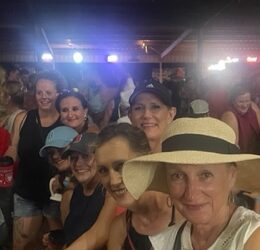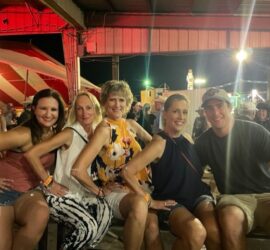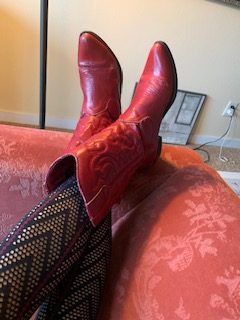When I was little, I thought everyone had huge, extended families. It was just the way things were. Seventeen aunts and uncles, sixty-something first cousins, and all living nearby. I never thought much about it. They were always there. I was aghast when I discovered that one of my friends only had one aunt and three cousins. That’s all? Really? What happened? I didn’t ask her but felt a sadness tugging at my heart. That’s when I started understanding and appreciating my culture, ancestry, and religion: Farmers, Czech, Catholic.

Large families were needed and welcomed if you lived on a farm, and in the eyes of the Catholic church, almost mandatory. That’s also when I started to feel special. Both my parents’ family farms were still operating when I was a child. Especially the Nors family farm on my mother’s side. I remember acres and acres of cotton and corn. My grandfather had a long, garage-type building that held his farm machinery, a blacksmith shop I loved to play in, and a butcher shop I avoided. Although I loved collecting eggs from the nests in the chicken coops, I felt that the hens were always mad at me for doing so. By the time I came around, my father’s brother, Jerome, had bought the Kaska farm from my grandmother, who moved to Dallas to live with her daughter. Uncle Jerome didn’t do much farming but raised cattle on the land. Both family farms were giant playgrounds for my sisters and me.
I regret never quizzing my grandparents about their lives before I was born. There just wasn’t a lot of that kind of talk in my family. So, I’m left wondering. On the Kaska side: what happened after my grandfather died, leaving a wife, a daughter, and seven young sons? How did they manage? Who ran the place? I’m not even sure if my paternal grandparents were born in this country.
But I knew more about my mother’s family, though still not enough to answer all of my questions. I knew that Grandma Nors, nee Heijl, was born in Czechoslovak. I assume Grandpa Nors was born in this country. The Heijl family has a monument in St. Mary’s Cemetery in West that summarizes their family history.
Even though I saw Grandma and Grandpa Nors every Sunday growing up, I didn’t spend much one-on-one time with them. With all those grandkids, that’s understandable, but I have a few simple memories I can call my own. I remember granda telling me that adding a splash of almond extract to a white cake made it taste so much better. It’s been decades since I baked a white cake with almond flavoring, but I can still taste it, and she was right—it’s delicious that way. Once Grandpa played baseball with us and ran the bases for me.
My paternal mother was a round, jolly woman, always smiling. Her hair was always in a bun, and she spoke Czech most of the time. I didn’t see her that often, but when she and my Aunt Christine, my dad’s oldest sibling, came for a visit, I so enjoyed their company. Aunt Christine used to play baseball with us too, but she wore her black business-type dress, black chunky-heeled shoes, and a string of pearls while running the bases. She never got to slide home. But I know she would have if the occasion had warranted it.
Here are some things I wish I knew about my grandparents:
- How did they meet?
- What did they do for fun?
- Why did they immigrate to this country?
- What was the boat ride like on the way over?
- Who did they leave behind in Czechoslovakia?
- Did they ever communicate with these family members?
- What made them happy?
- What annoyed them?
- Did they have any regrets?
- What did they think of me?
I just returned from Texas, where I had the chance to visit some of my relatives in West. Unfortunately, there aren’t as many as there used to be. Then again, there are actually more, but I don’t know most of them because they are second, third, and so-forth cousins. But I’m grateful they are out there. And thank goodness for Facebook.

My visit home took place at the end of a hectic book tour through Texas. So I was more than ready for a rest, and luckily, the downtime came just in time for the three-day-long annual WestFest. Saturday morning during the parade, cousin Sharon Jackson invited me to have a book signing at her flower/gift shop, Divine Design. When I come to West, I usually stop by her shop to catch up on what’s happening with the family. However, several relatives came to see me this time, and I also ran into others at WestFest. As they told me what was happening in their lives, I noticed a gleam in their eyes when they spoke: no matter their story, good times, or troubled times, that gleam was always there, reflecting love, pride, hope, and gratitude. I spoke to a familiar-looking face the morning of the festival’s Kolache 5000 race. He recognized me, and I was embarrassed to not remember him. A few minutes later, I asked my sister who he was. Turned out he was a first cousin on my mother’s side. I went back to speak to him again, apologizing for not recognizing him. He told me about his family, his sons who had high-level jobs with the government, and some health problems he was dealing with—all with that gleam that warmed my heart.
On that visit, I made a point to pay attention, to savor their words. And I’m so grateful to Sharon for being my family-central. I know I can always walk into her shop and get the lowdown on these wonderful folks and relatives I will never take for granted. And West (comma) Texas will always be my home base.



I wish that I had known that you were doing book signing at Divine Design, I would have stopped by and brought my ggs and bought your book..
Delightful! Your visit to west sounded heavenly!
Next time, Ruth. You’ll have to join us.
Great post, Kathleen. I, too, grew up with a gazillion cousins in the same town where our parents were born. My brothers and sisters, all the cousins attended the same high school as our parents. My two brothers and two sisters are now scattered all across Texas. In spite of my efforts to stay in touch and encourage face to face time . . . we have drifted apart. A few years back I just gave up holding on.
Keep up the “bantering.” I enjoy the photos with bittersweet interest. . . displays of relationships that I miss terrible at times.
Thanks, Karen. As I get older, I realize how important it is to stay in touch with my cousins. I hope you can reconnect with your siblings one day.
I’m living same story this via my in-laws. Catholic. Farmers. Czech♥️
There are a lot of us out there, Audrey!